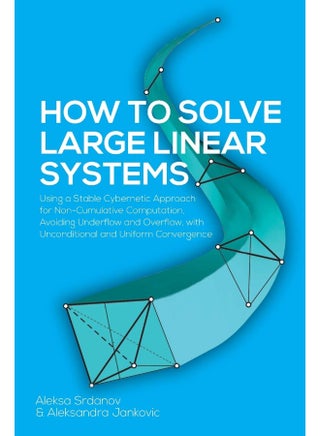Free & Easy Returns
Best Deals



| Publisher | Brown Walker Press |
| ISBN 10 | 1627347380 |
| Book Description | Solving the linear equation system n x n can also be a problem for a computer, even when the number of equations and unknowns is relatively small (a few hundred). All existing methods are burdened by at least one of the following problems: 1) Complexity of computation expressed through the number of operations required to be done to obtaining solution; 2) Unrestricted growth of the size of the intermediate result, which causes overflow and underflow problems; 3) Changing the value of some coefficients in the input system, which causes the instability of the solution; 4) Require certain conditions for convergence, etc. In this paper an approximate and exact methods for solving a system of linear equations with an arbitrary number of equations and the same number of unknowns is presented. All the mentioned problems can be avoided by the proposed methods. It is possible to define an algorithm that does not solve the system of equations in the usual mathematical way, but still finds its exact solution in the exact number of steps already defined. The methods consist of simple computations that are not cumulative. At the same time, the number of operations is acceptable even for a relatively large number of equations and unknowns. In addition, the algorithms allows the process to start from an arbitrary initial n-tuple and always leads to the exact solution if it exists. |
| Book Format | Paperback |
| Publication Date | 1 December 2019 |
| ISBN 13 | 9781627347389 |
| About the Author | Aleksa Srdanov was born in 1958 in Ruma, the Republic of Serbia. He graduated from the Faculty of Mathematics in Beogard in 1981 and worked in scence until 2010. His narrow interests are: number theory, multidimensionality, artificial intelligence and philosophy of natural sciences. His work is based on the finding and using some invariant properties of the subject of research and therefore without a doubt, bit can be said that his approach is cybernetic. In the theory of numbers, he worked on the problem of number of partitions and the general form of the partition function. This monograph is a result of his investigation of the invariant properties of all dimensional spaces. He has also published in philosophy and works related to problems of infinity, as well as problems of undecidability.Aleksandra M. Jankovic was born in Pozarevac, Serbia, in 1983. He studied at University of Kragujevac, Mathematical Science and completed doctoral thesis in Mechanical Engineering, University of Belgrade. He has published 12 papers and one monograph, and is currently working at Technical College of Pozarevac. |
| Author | Aleksa Srdanov |
| Language | English |
| Number of Pages | 74 pages |

